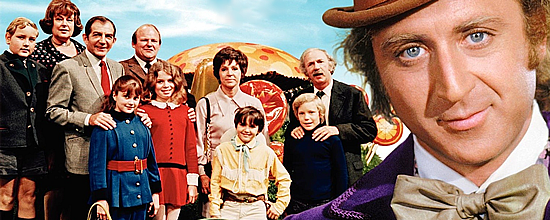
For this week’s “Things That Bring Back Memories” post, I am going to pick something in the topic of “MOVIES” and go with “Willy Wonka and the Chocolate Factory“. This movie was released in 1971 (so even before my time), and is one that never seems to grow old. It did come out again later with Johnny Depp, but in my opinion, that movie was horrible…I guess I’m biased.
Willy Wonka and the Chocolate Factory appealed to so many. No matter your walk of life, where you were from, etc., there was a character in the movie, that you felt you could be a part of their “group”. I remember wanting to smack the little girl in red, for her attitude to her Dad. Even some of the other characters needed restriction, for just not listening to what they were told. Good old Charlie had respect, love and compassion and made you just want to be his friend…even though he lived in a not so great area…but with wonderful people!
If, for some reason, you are of an age that makes it difficult to remember this great movie, here’s a preview of what it was about:
Did you ever watch this movie when you were younger? or have you seen it on TV later in life? Let me know what you thought of it, and if you have any memories of it in your life!
More Info on the Movie:
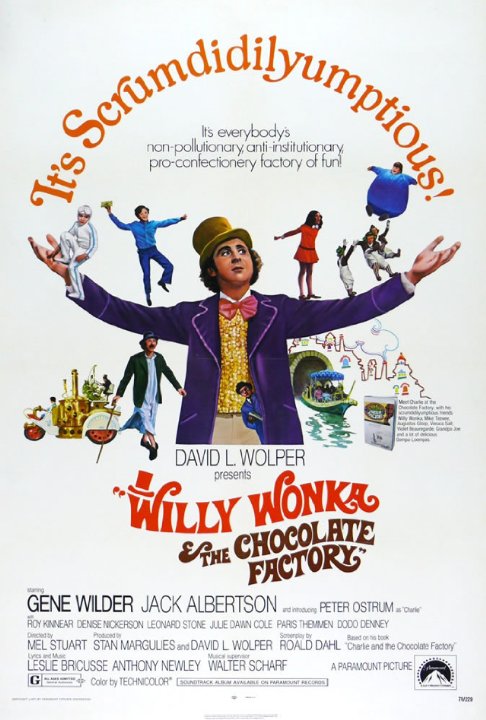 Willy Wonka & the Chocolate Factory is a 1971 musical fantasy film directed by Mel Stuart, and starring Gene Wilder as Willy Wonka. The film, a film adaptation of the 1964 novel Charlie and the Chocolate Factory by Roald Dahl, tells the story of Charlie Bucket (Peter Ostrum, in his only film appearance) as he receives a Golden Ticket and visits Willy Wonka’s chocolate factory with four other children from around the world.
Willy Wonka & the Chocolate Factory is a 1971 musical fantasy film directed by Mel Stuart, and starring Gene Wilder as Willy Wonka. The film, a film adaptation of the 1964 novel Charlie and the Chocolate Factory by Roald Dahl, tells the story of Charlie Bucket (Peter Ostrum, in his only film appearance) as he receives a Golden Ticket and visits Willy Wonka’s chocolate factory with four other children from around the world.
Filming took place in Munich in 1970, and the film was released by Paramount Pictures on June 30, 1971. With a budget of just $3,000,000, the film received positive reviews and performed well in 1971, but it was not a huge box-office success, only earning about $1,000,000 more than its budget at the end of its original run. It then made an additional $21 million during its 1996 re-release.
The film has since developed a cult following especially due to its repeated television airings and home entertainment sales. In 1972, the film received an Academy Award nomination for Best Original Score, and Wilder was nominated for the Golden Globe Award for Best Actor – Motion Picture Musical or Comedy, but lost both to Fiddler on the Roof. In 2014, the film was selected for preservation in the United States National Film Registry by the Library of Congress as being “culturally, historically, or aesthetically significant”.
Until 1977, Paramount distributed the film. From then on, all the rights to the film were handed over to Warner Bros. for home entertainment purposes starting in the 1980’s. The film had become a big success in that medium ever since.
The Plot:
In an unnamed European town, children go to a candy shop after school. Charlie Bucket, whose family is poor, can only stare through the window as the owner sings “Candy Man”. The newsagent for whom Charlie works after school gives him his weekly pay, which Charlie uses to buy a loaf of bread. On his way home, he passes the legendary Willy Wonka’s chocolate factory. A mysterious tinker recites the first lines of William Allingham’s poem 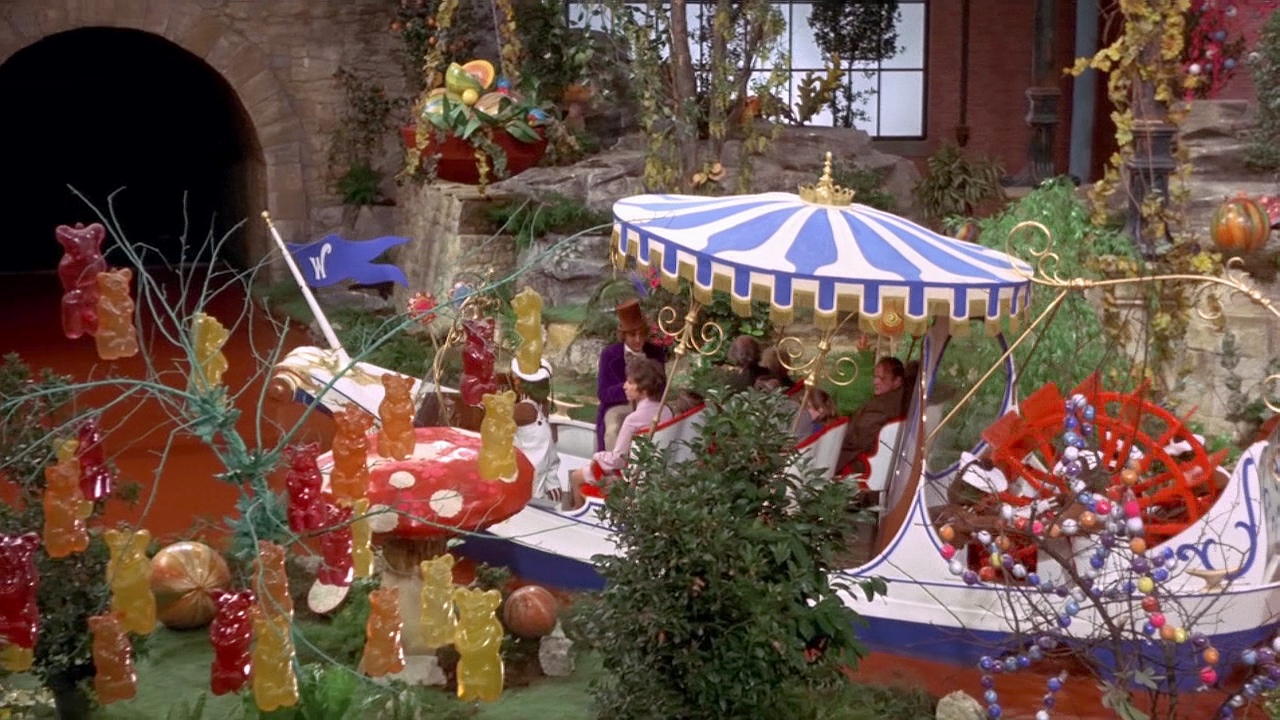 “The Fairies”, and tells Charlie, “Nobody ever goes in, and nobody ever comes out.” Charlie rushes home to his widowed mother and his four bedridden grandparents. After he tells Grandpa Joe about the tinker, Joe tells him that Wonka locked the factory because his arch rival, Mr. Slugworth, and other candy makers sent spies disguised as employees to steal Wonka’s recipes. Wonka disappeared, but three years later began selling more candy. The origin of Wonka’s labor force is a mystery.
“The Fairies”, and tells Charlie, “Nobody ever goes in, and nobody ever comes out.” Charlie rushes home to his widowed mother and his four bedridden grandparents. After he tells Grandpa Joe about the tinker, Joe tells him that Wonka locked the factory because his arch rival, Mr. Slugworth, and other candy makers sent spies disguised as employees to steal Wonka’s recipes. Wonka disappeared, but three years later began selling more candy. The origin of Wonka’s labor force is a mystery.
Wonka announces to the world that he has hidden five “Golden Tickets” in his chocolate Wonka Bars. The finders of these tickets will be given a tour of his factory and a lifetime supply of chocolate. Four of the tickets are found by Augustus Gloop, a gluttonous German boy; Veruca Salt, a spoiled English girl; Violet Beauregarde, a gum-chewing American girl; and Mike Teevee, a television-obsessed American boy. As each child is heralded to the world on TV, a sinister-looking man is observed whispering to them. News breaks that the final ticket has been found by a Paraguayan millionaire.
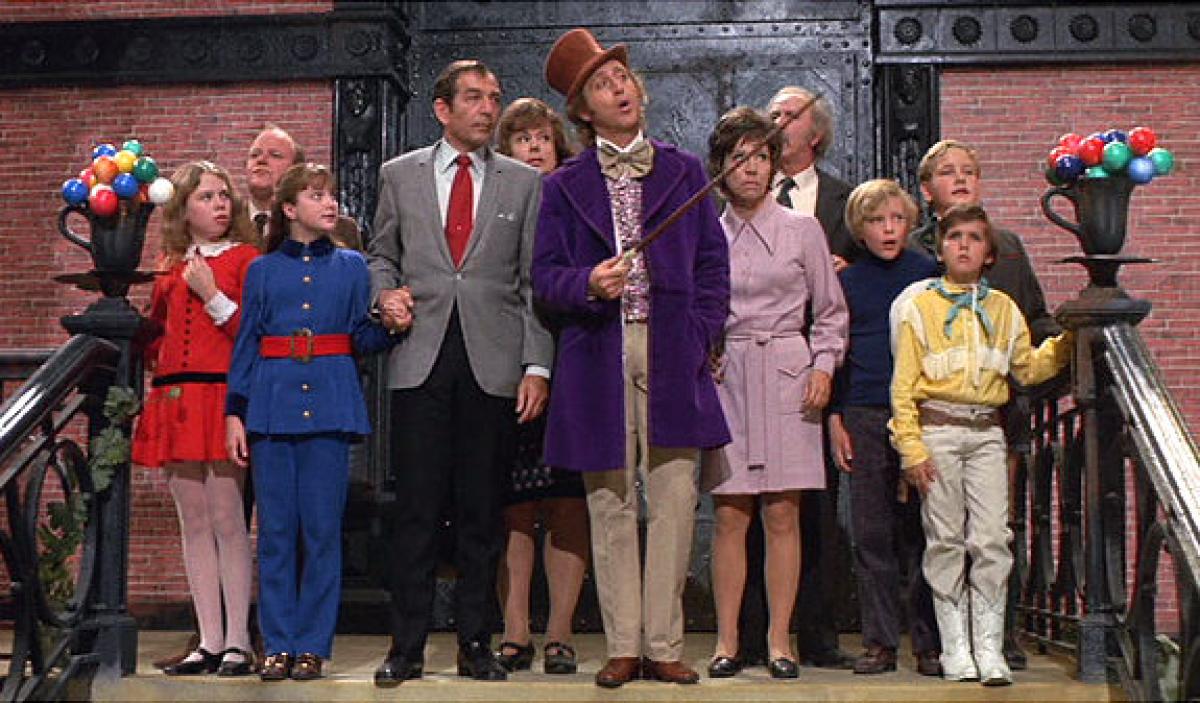 The next day, Charlie finds money in a gutter and uses it to buy a Wonka Bar. He has change left that he uses to buy another Wonka bar that he intends to bring to his family. On leaving the candy store, he learns from people in the street that the millionaires ticket was a fraud and that the real is still at large. When Charlie opens the Wonka bar, he finds the final golden ticket. While racing home, he is confronted by the sinister man seen whispering to the other winners. The man introduces himself as Slugworth. He offers to pay Charlie for a sample of Wonka’s latest creation, the Everlasting Gobstopper.
The next day, Charlie finds money in a gutter and uses it to buy a Wonka Bar. He has change left that he uses to buy another Wonka bar that he intends to bring to his family. On leaving the candy store, he learns from people in the street that the millionaires ticket was a fraud and that the real is still at large. When Charlie opens the Wonka bar, he finds the final golden ticket. While racing home, he is confronted by the sinister man seen whispering to the other winners. The man introduces himself as Slugworth. He offers to pay Charlie for a sample of Wonka’s latest creation, the Everlasting Gobstopper.
Charlie returns home with his news. Grandpa Joe is so elated that he finds he can walk, and Charlie chooses Grandpa Joe as his chaperone. The next day, Wonka greets the children and their chaperones at the factory gates. Each is required to sign an extensive contract before the tour begins. The factory is a psychedelic wonderland that includes a river of chocolate, edible mushrooms, lickable wallpaper, and other marvellous inventions. Wonka’s workers are small, orange-skinned, green-haired Oompa-Loompas.
As the tour progresses each child ignore the rules; Augustus ignores Wonka’s warnings and falls into the chocolate river while trying to drink from it. He is sucked through a pipe which leads elsewhere; Wonka summons an Oompa Loompa to guide Mrs. Gloop to the “Fudge Room” before Augustus is harmed. In his “Inventing Room”, the remaining children are each given a sample of Wonka’s Everlasting Gobstoppers. Violet inflates into a giant blueberry after trying an experimental piece of Three-Course-Dinner Gum against Wonka’s wishes. Veruca throws a tantrum after Wonka refuses to sell her a “golden goose”, and falls down a garbage chute; her father also falls into it. Mike is shrunk to a few inches in height after being transmitted against Wonka’s wishes by “Wonkavision”, a broadcasting technology 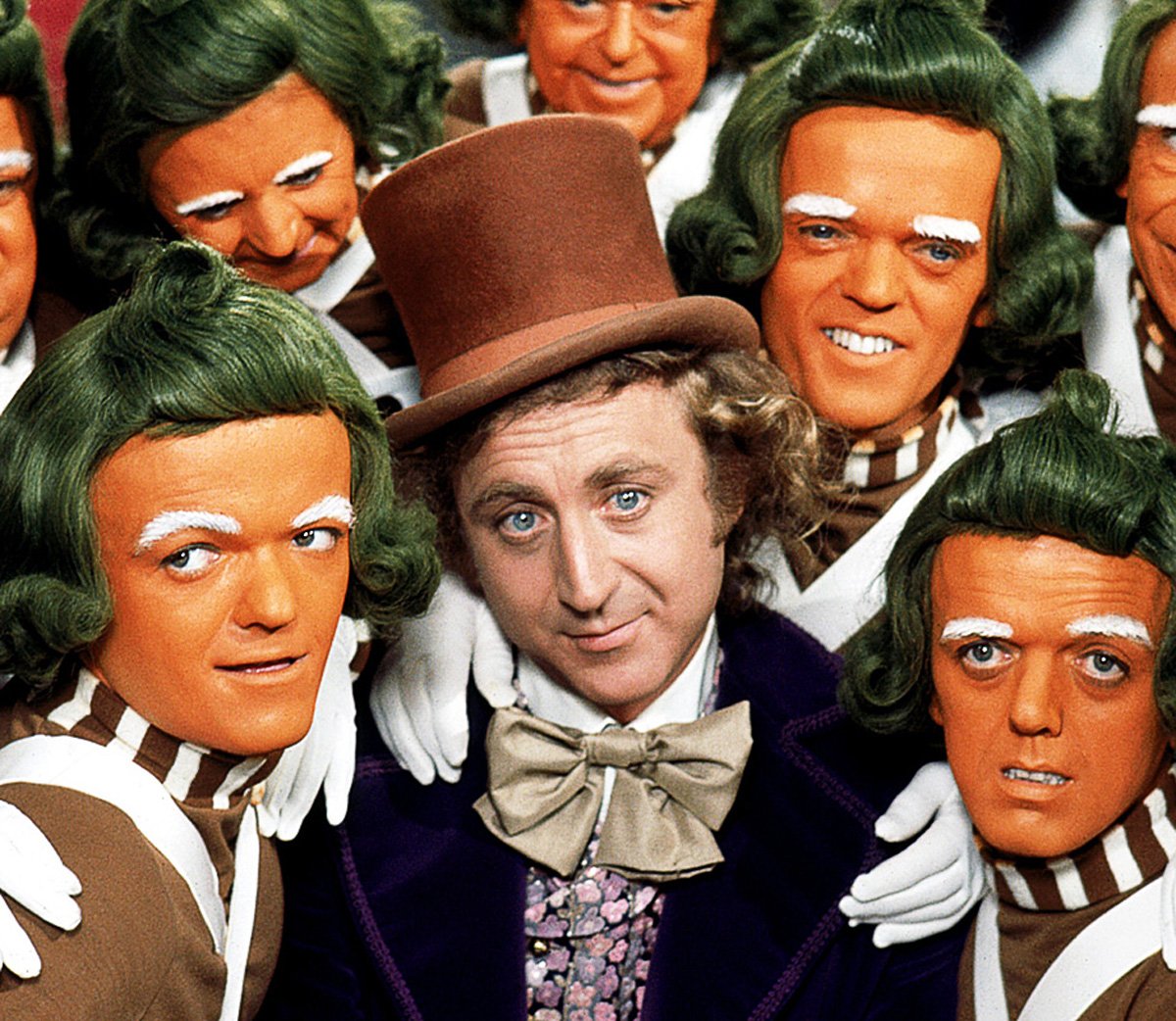 that sends objects through space instead of pictures. The Oompa-Loompas guide each child’s parents to a place where they might rescue their children.
that sends objects through space instead of pictures. The Oompa-Loompas guide each child’s parents to a place where they might rescue their children.
During the tour, Charlie and Grandpa Joe also succumb to temptation: they stay behind in the Bubble Room and secretly sample Fizzy Lifting Drinks. They begin floating skyward and are nearly sucked into an ceiling mounted exhaust fan. To avoid this grisly fate, they burp until they return to the ground. Wonka initially seems unaware of this incident, but when Charlie becomes the only child on the tour, Wonka dismisses him and Grandpa Joe and leaves for his office. Grandpa Joe follows Wonka to ask about Charlie’s lifetime supply of chocolate, to which Wonka angrily states that Charlie violated the contract by stealing Fizzy Lifting Drinks and therefore receives nothing. Wonka dismisses them, and Grandpa Joe suggests that Charlie give Slugworth the Gobstopper in revenge, but Charlie can’t bring himself to intentionally hurt Wonka, instead he returns the Gobstopper to Wonka and apologizes.
Wonka apologizes to them and reveals that “Slugworth” is actually an employee names Mr. Wilkinson, and the offer to buy the Gobstopper was a test for all the kids; and Charlie was the only one who passed. The trio enter the “Wonkavator”, a glass elevator that flies out of the factory. Soaring over the city, Wonka tells Charlie that his prize is the factory itself as Wonka created the contest to find a child honest and worthy enough to be his heir. Charlie and his family will live in the factory immediately and take over its operation when Wonka retires.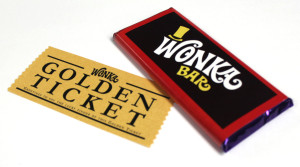
Some of the Characters:
Gene Wilder (Willy Wonka) was born Jerome Silberman in Milwaukee, Wisconsin, to Jeanne (Baer) and William J. Silberman, who manufactured 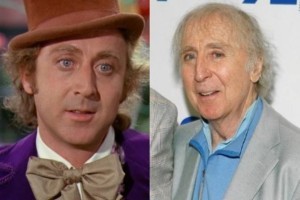 miniature whiskey and beer bottles. His father was a Russian Jewish immigrant, while his Illinois-born mother was of Russian Jewish descent. Wilder caught his first big break playing a small role in the off-Broadway production of Arnold Wesker’s “Roots” and followed quickly with his Broadway debut as the comic valet in “The Complaisant Lover” (both 1961), for which he won the Clement Derwent Award. His other Broadway credits included “One Flew Over the Cuckoo’s Nest” (1963, with Kirk Douglas), “The White House” (1964, with Helen Hayes) and “Luv” (1966), but it was a 1963 Broadway production of “Mother Courage and Her Children” that altered the course of his life forever. In its cast was Anne Bancroft, who was dating Mel Brooks at the time, and the relationship established between the two men eventually led to Wilder’s becoming part of Brooks’ “stock company”. Wilder’s Actor’s Studio connection may have helped him land his first feature, Bonnie and Clyde (1967), in which he drew much favourable attention in a small but memorable role as a frightened young undertaker abducted by the legendary duo. Wilder’s performance as the endearingly frantic Leo Bloom in The Producers (1967) kicked off his celebrated collaboration with Mel Brooks and garnered him an Academy Award nomination as Best Supporting Actor. His career gained momentum as he played a swashbuckler in Start the Revolution Without Me (1970), and the candy impresario of Willy Wonka & the Chocolate Factory (1971). Wilder re-teamed with Mel Brooks for the inspired lunacy of Blazing Saddles (1974) and Young Frankenstein (1974), earning his second Oscar nomination for his first-time screen-writing efforts (along with Mel Brooks) on the latter. Spurred by these triumphs, Wilder made his directorial debut (in addition to acting and starring) with The Adventure of Sherlock Holmes’ Smarter Brother (1975). His first association with Richard Pryor had come on Blazing Saddles (1974), but Richard Pryor (co-screenwriter) had lost out in his bid for the Cleavon Little role. Richard Pryor and Wilder first acted together in the highly entertaining and commercially successful Silver Streak (1976) and scored at the box office again with Stir Crazy (1980), but their later efforts were mediocre. Ironically, Hanky Panky (1982), Wilder’s first of three films with his late wife Gilda Radner, originally was written to pair him with Richard Pryor again, but Richard Pryor’s unavailability necessitated rewriting the part for Gilda Radner.
miniature whiskey and beer bottles. His father was a Russian Jewish immigrant, while his Illinois-born mother was of Russian Jewish descent. Wilder caught his first big break playing a small role in the off-Broadway production of Arnold Wesker’s “Roots” and followed quickly with his Broadway debut as the comic valet in “The Complaisant Lover” (both 1961), for which he won the Clement Derwent Award. His other Broadway credits included “One Flew Over the Cuckoo’s Nest” (1963, with Kirk Douglas), “The White House” (1964, with Helen Hayes) and “Luv” (1966), but it was a 1963 Broadway production of “Mother Courage and Her Children” that altered the course of his life forever. In its cast was Anne Bancroft, who was dating Mel Brooks at the time, and the relationship established between the two men eventually led to Wilder’s becoming part of Brooks’ “stock company”. Wilder’s Actor’s Studio connection may have helped him land his first feature, Bonnie and Clyde (1967), in which he drew much favourable attention in a small but memorable role as a frightened young undertaker abducted by the legendary duo. Wilder’s performance as the endearingly frantic Leo Bloom in The Producers (1967) kicked off his celebrated collaboration with Mel Brooks and garnered him an Academy Award nomination as Best Supporting Actor. His career gained momentum as he played a swashbuckler in Start the Revolution Without Me (1970), and the candy impresario of Willy Wonka & the Chocolate Factory (1971). Wilder re-teamed with Mel Brooks for the inspired lunacy of Blazing Saddles (1974) and Young Frankenstein (1974), earning his second Oscar nomination for his first-time screen-writing efforts (along with Mel Brooks) on the latter. Spurred by these triumphs, Wilder made his directorial debut (in addition to acting and starring) with The Adventure of Sherlock Holmes’ Smarter Brother (1975). His first association with Richard Pryor had come on Blazing Saddles (1974), but Richard Pryor (co-screenwriter) had lost out in his bid for the Cleavon Little role. Richard Pryor and Wilder first acted together in the highly entertaining and commercially successful Silver Streak (1976) and scored at the box office again with Stir Crazy (1980), but their later efforts were mediocre. Ironically, Hanky Panky (1982), Wilder’s first of three films with his late wife Gilda Radner, originally was written to pair him with Richard Pryor again, but Richard Pryor’s unavailability necessitated rewriting the part for Gilda Radner.
Jack Albertson (Grandpa Joe) (June 16, 1907 – November 25, 1981) was an American character actor who also performed in vaudeville. A 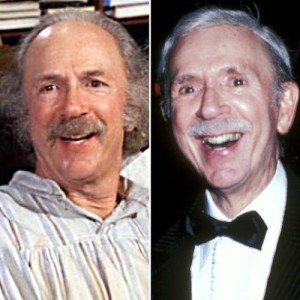 comedian, dancer, singer, and musician, Albertson is perhaps best known for his roles as Manny Rosen in The Poseidon Adventure (1972), Grandpa Joe in Willy Wonka & the Chocolate Factory (1971) and Amos Slade from The Fox and the Hound (1981). For his contributions to the television industry, Albertson was honored with a star on the Hollywood Walk of Fame at 6253 Hollywood Boulevard. A former song-and-dance man and veteran of vaudeville, burlesque and Broadway, Jack Albertson is best known to audiences as “The Man” in the TV series Chico and the Man (1974), for which he won an Emmy. In 1968 Albertson, the brother of actress Mabel Albertson, won the Oscar for Best Supporting Actor in The Subject Was Roses (1968), a part which also won him the Tony award during its Broadway run.
comedian, dancer, singer, and musician, Albertson is perhaps best known for his roles as Manny Rosen in The Poseidon Adventure (1972), Grandpa Joe in Willy Wonka & the Chocolate Factory (1971) and Amos Slade from The Fox and the Hound (1981). For his contributions to the television industry, Albertson was honored with a star on the Hollywood Walk of Fame at 6253 Hollywood Boulevard. A former song-and-dance man and veteran of vaudeville, burlesque and Broadway, Jack Albertson is best known to audiences as “The Man” in the TV series Chico and the Man (1974), for which he won an Emmy. In 1968 Albertson, the brother of actress Mabel Albertson, won the Oscar for Best Supporting Actor in The Subject Was Roses (1968), a part which also won him the Tony award during its Broadway run.
Peter Ostrum (Charlie Bucket) (born November 1957) is an American former child actor whose only film role was as Charlie Bucket in the 1971 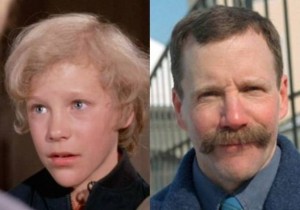 motion picture Willy Wonka & the Chocolate Factory. He currently works as a veterinarian in Lowville, New York, where he has taken part in Pfizer’s video series Veterinarians on Call. A native of Cleveland, Ostrum was 12 years old when selected by talent agents for Willy Wonka. Though he enjoyed the experience of shooting the film, he opted not to sign a three-film contract when it was over. After eschewing a career in film and theater, Ostrum became reluctant to speak about his one starring role. In 1990, he began an annual tradition of speaking to schoolchildren about the film, and he became a subject of interest again when 2005’s Charlie and the Chocolate Factory was released in theaters. Ostrum became interested in horses when he returned from shooting Willy Wonka, and was particularly influenced by the veterinarian that tended to them. Receiving his Doctorate of Veterinary Medicine from Cornell University College of Veterinary Medicine in 1984, Ostrum now practices and lives in Lowville, New York, with his wife Loretta (née Lepkowski), and two children: his son Leif and daughter Helenka.
motion picture Willy Wonka & the Chocolate Factory. He currently works as a veterinarian in Lowville, New York, where he has taken part in Pfizer’s video series Veterinarians on Call. A native of Cleveland, Ostrum was 12 years old when selected by talent agents for Willy Wonka. Though he enjoyed the experience of shooting the film, he opted not to sign a three-film contract when it was over. After eschewing a career in film and theater, Ostrum became reluctant to speak about his one starring role. In 1990, he began an annual tradition of speaking to schoolchildren about the film, and he became a subject of interest again when 2005’s Charlie and the Chocolate Factory was released in theaters. Ostrum became interested in horses when he returned from shooting Willy Wonka, and was particularly influenced by the veterinarian that tended to them. Receiving his Doctorate of Veterinary Medicine from Cornell University College of Veterinary Medicine in 1984, Ostrum now practices and lives in Lowville, New York, with his wife Loretta (née Lepkowski), and two children: his son Leif and daughter Helenka.
The reactions of the actors in some scenes are spontaneous. For example, when the children first enter the Chocolate Room and see the candy gardens, their reactions are real, it was really their first view of that particular set.
The chocolate river was made of real chocolate, water, and cream. It spoiled fairly quickly and left a foul smell.
After reading the script, Gene Wilder said he would make the film under one condition: that he would be allowed to somersault in the scene when he first meets the children. When asked why, Gene Wilder replied that having Willy Wonka start out limping and end up somersaulting would set the tone for that character. He wanted to portray him as someone whose actions were completely unpredictable. His request to somersault was granted.
Julie Dawn Cole (Veruca Salt) did not know the rock in the chocolate room she was dropping down onto to smash the watermelon-sized chocolate egg was real and she badly cut her left knee falling onto it. If you watch carefully in her first scene with the egg you can see her left stocking is bloody. She still has a scar on her knee from the injury.
This movie was shot in Munich, Germany, but the producers had to go outside of Germany to recruit enough little people to play the Oompa Loompas (one of the many tragic legacies of the Nazi era). Many of the people cast as Oompa Loompas (German or otherwise) did not speak English fluently, if at all. This is why some appear to not know the words to songs during the musical numbers.
Sammy Davis Jr. expressed an interest in playing Bill, the candy store owner, but the film-makers deemed it as too kitschy and declined. Nevertheless, the candy store song, “The Candyman”, became a staple of Davis’ stage show for many years.
During her song “I Want it Now”, Julie Dawn Cole mentions a bean feast. This is a British expression that means plenty of everything.
The face in the psychedelic tunnel movie is that of Walon Green, friend of director Mel Stuart and screenwriter of The Wild Bunch (1969). According to Stuart’s memoirs, Green is the only person who would agree to let a centipede crawl on his face for the sake of a children’s film.
Even though the film didn’t do well at the box office, surprisingly, when it was released to home video, it gained more attention. Willy Wonka & the Chocolate Factory (1971) was one of the more popular movies for rentals by the time the rental fad took off in the 80’s.
During the construction of Willy’s office, in which everything is cut in half, one of the prop men accidentally sawed in half a non-prop coffee pot that someone had put in the work area. Only when coffee began spilling out did he realize his mistake.
Thanks for stopping by today. Please be sure to leave a comment, if this show meant something to you, too. Or to just let me know what you think of the story in this post! TigerStrypes claims no credit for any images used on this post, unless otherwise noted. Images in this post are copyright to their respectful owners. If there is an image appearing on this blog that belongs to you and do not wish for it appear on this site, please email us with a link to said image and it will be promptly removed. Thanks and have a great day!!


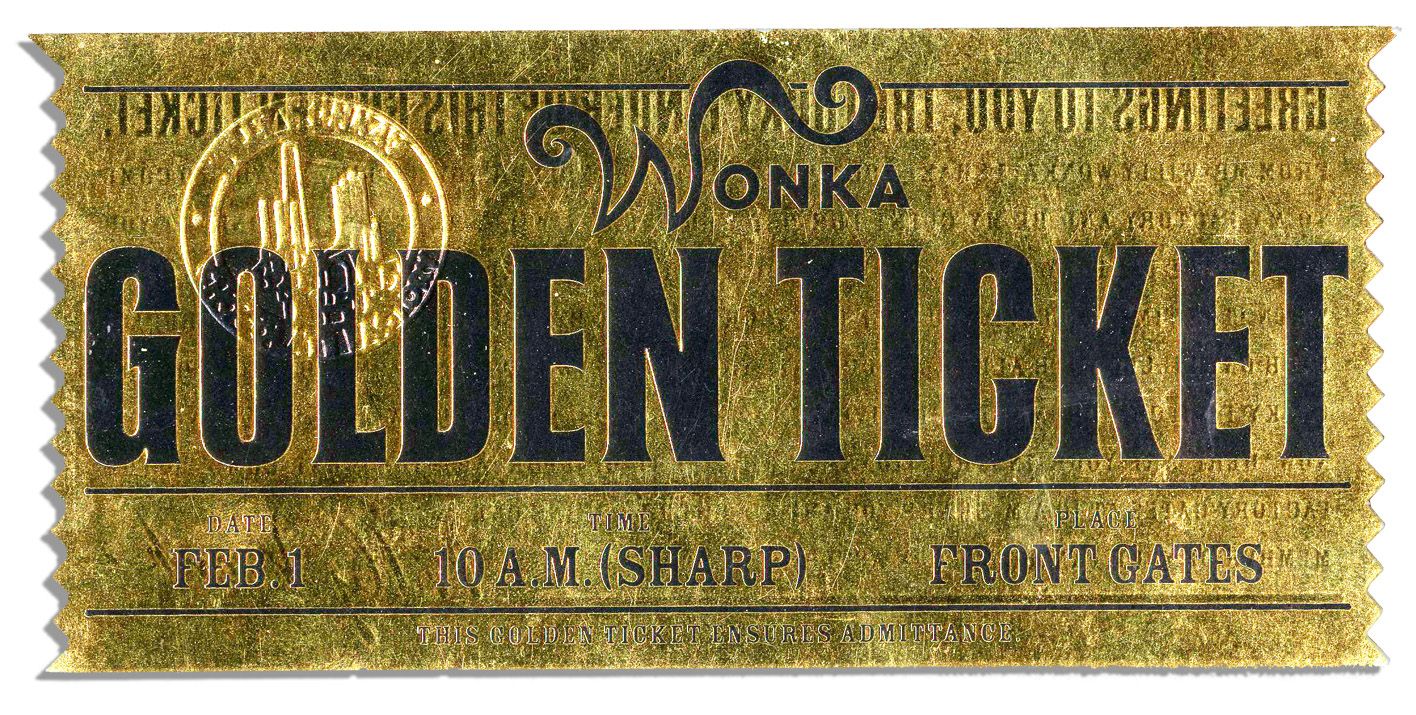
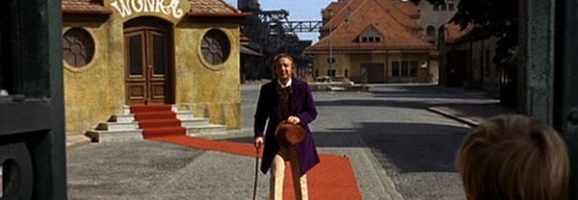
I love this Movie! I have a memory of it which is when I first saw it in Pre-School when I was only 3. I then hadn’t seen it for 4 years but during that time I thought a little about it. Then when I was 8 this just became one of my all time favorites and that year was a time when I was madly obsessed with it.
It’s definitely one you remember for a long time.
I loved this movie so much when I was little! I preferred this one to the newer one, though both have their pros and cons. One of them was Verucas incident, I feel the golden goose garbage chute was more fun than the squirrels deciding to throw her down their chute. That is really cool that the chocolate river was real though, I had no idea.
I have always wondered what a bean feast was! lol! My kids and I JUST watched this movie on Easter Sunday at my moms house. We watch it often. It is one of their favorites. I loved all of the trivia at the end. I haven’t previously heard most of those tidbits!
How fun Cristi!! This is one of those movies that you can watch at any age and continue to love!! I’m loving learning about and sharing the extra stuff, too – it’s fun!
My family love this film and now I’ll have to watch it with them again to see if I can spot Veruca Salt’s bloody knee. 🙂
This movie definitely brings back a lot of memories from my childhood. It is such a feel good movie that teaches kids valuable lessons.
Dang!! Charlie is totally grown!! lol fun post!! I learned so much!
Isn’t it weird to see how certain people look now? You never figure the ones on TV get older!! 🙂
This movie was fun, crazy, strange and entertaining.
Awe, happy memories! We love Willy Wonka. One of my good friends is super obsessed with Willy Wonka! 🙂
I adore this movie and this post has reminded me that my kids have never seen this! Time to break it out!!
I love this movie. Both the old and new ones are goo.
one of my all time favs loved the books and the movie and a great family movie as well.
You are not alone! I cannot stand the Johnny Depp version of this movie! Of course, it’s not really the same–even the title is different. Still… Every time I watch the original movie, I marvel at how incredible Gene Wilder played Willy Wonka. You just never knew what to expect from him and even when he’s not speaking, watching his reactions to the kids and parents shows what an amazing actor he is. His final scene with Charlie and Grandpa–ugh! Gets me every time! Thanks for the memories and I’m so glad I found your blog via the Manic Mondays… Read more »
So true Marie – he was amazing, as was the whole cast. Love the memories!! Thanks for stopping by!
I have to saw that I am definitely loyal to the original film. I really enjoyed this as child and my children like it just as much. The oompa loompas are my favorite part and their song.
So true!! I didn’t like how they only used one in the new movie and then copied him everywhere. This older one gave a lot of people a job when it was needed, in that time! 🙂